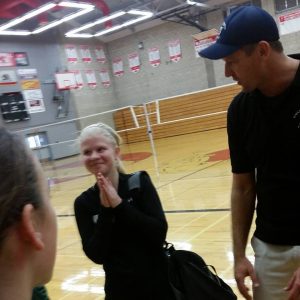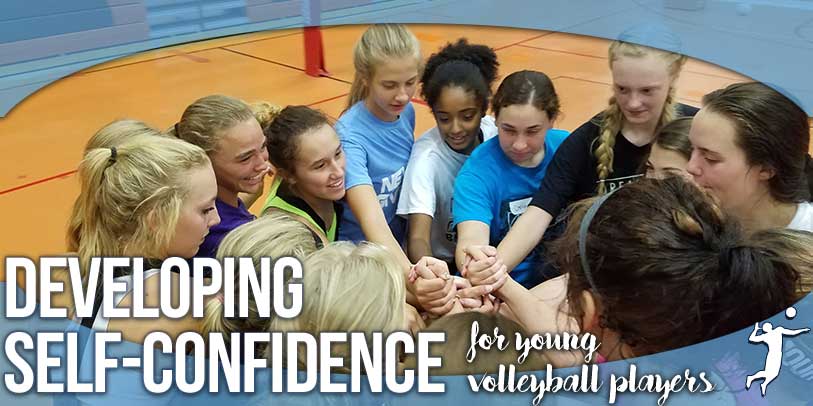
Andor Gyulai (Right) Coaching his son Thor 9 (Orange) to his first gold for beach.
Before you can change any skill on the court – passing, setting, hitting, anything – you must first change one aspect off of it: Your belief in yourself.
A lack of self-confidence – often inaccurate and subjective – is far too common in young players, and it results in poor performances, which leads to a continued lack of confidence, which produces even worse performances. A vicious cycle, truly.
Our job as coaches is to change that. Allow me to show you exactly how the Volleyball1on1 Coaching System can replace that lack of confidence, filling the void instead with pride and hunger for more.
In his New York Times bestselling book, author Brian Tracey writes: “Change your thinking, change your life.”
He goes on to describe the starting point of any endeavor as your understanding of your self-concept.
He writes: “Your self-concept has three parts, like a pie divided into three wedges. Each is linked with each of the others. All three elements together make up your personality. They largely determine what you think, feel, and do, and everything that happens to you.
“Your self-ideal is the first of three part of your personality. Your self-ideal is made up of your hopes, dreams, visions and ideals. Your self-ideal is composed of the virtues, values and qualities that you most admire in yourself and others. Your self-ideal is the person you would most like to become, if you could be a perfect person in every way. These ideals guide and shape your behavior.
“Great men and women, leaders and people of character are very clear about their values, vision and ideals. They know who they are and what they believe in. They set high standards for themselves, and they don’t compromise those standards.”
At Volleyball1on1 we describe these self-ideals as our “Volleyball1on1 winning team culture,” and “what good looks like.”

Is this not the purpose of sports? To help children develop into better people?


These are concepts we develop with coaches during their Volleyball1on1 camp after establishing, through practices and exercises, what the goals, visions and ideals for the team are. But we also add our own experiences from working with the best players, coaches and teams from around the world, pooling our knowledge to show you exactly how you can reach the highest standards that you admire in others.
“The second part of your self-concept,” Tracey writes, “is your self-image. This is the way you see yourself and think about yourself. It is often called your inner mirror. It is how you look internally to see how you should behave in particular situations. Because of the power of your self-image, you always perform on the outside consistent with the picture you have of yourself on the inside.”
At Volleyball1on1, we believe it is the job of the coach to craft an environment that is conducive to developing every player’s self-image. This includes teaching through drills and exercises aimed at building a “winning team culture” and emphasizing “what good looks like,” to helping players to perform specific behaviors / volleyball skills in a positive way. Equally important, these exercises will also stress the importance of recognizing excellence in behaviors relative to themselves and others, which produces a heightened level of trust on the team.
There is such an abundance of opportunities to recognize excellence: tell a teammate when they make a good dig or pass or set, support the overall culture of the team, being competitive while also remaining considerate to your teammates. All can contribute successfully to improving a players self-image.
Great coaches take players along a journey each season and improve players “self-image” as they view themselves and the team relative to “what good looks like” and how they behave relative to the “Volleyball1on1 winning team culture.” – Andor Gyulai
“The third part of your self-concept is your self-esteem,” Tracey writes. “This is the emotional component of your personality, and it is the most important factor in determining how you think, feel and behave. Your level of self-esteem largely determines much of what happens in your life. The more you like yourself, the better you perform at anything you attempt. And by the law of reversibility, the better you perform, the more you like yourself.
“The result, people with high self-esteem are virtually unstoppable.”
Our Job as Coaches
Your level of self-esteem is largely determined by how closely your self-image – your current performance and behaviors – matches your self-ideal.
Over the course of a season, our job as coaches is to steer the team towards a “winning team culture,” while establishing “what good looks like.” The result is that players will develop confidence individually, which will then permeate onto the team as their behaviors and performances begin to match their self-ideal.
The correct timing of the self-concept theory can result in players peaking at just the right time of season, all within the full control of the coach! – Andor Gyulai
And while the process is not easy or going to happen overnight, it is more than worth it. A fair warning, however: Parents and administrators…are going to love you! Why? Because if you begin with the right self-ideal, meaning “Team winning culture,” imagine the trickle-down effect of who your players develop into as well as the new attitude and confidence.
For example, our Volleyball1on1 team culture:
- Develops excellent communicative, goal-setting, self-directed, critical thinking lifelong learners who thrive in competition and under pressure, who know how to work as individuals and or with a team as a member or a leader while being fair and considering others.
Is that not our ultimate goal as a coach? Developing people of worth that add to our community and make the world a better place? If you would like help doing that using the Volleyball1on1 Coaching System, schedule a call to review how our Volleyballl1on1 Camps can help you!
Related resources:
Volleyball1on1 Summer Camp Overview
Schedule a call with Andor Gyulai to review our running a summer camp together.
Articles:







